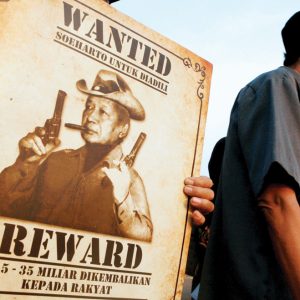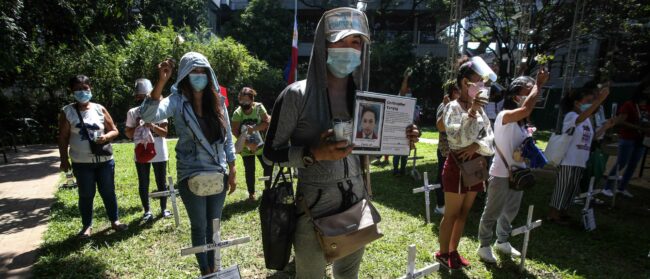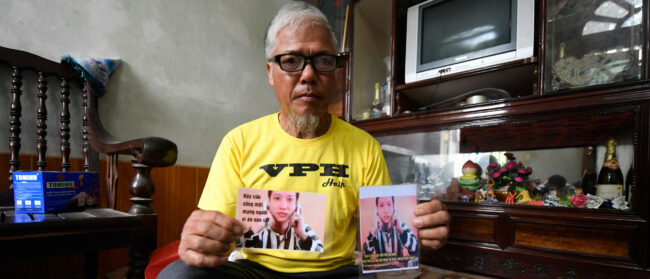General Suharto came from humble beginnings. Indonesia’s former leader, who oversaw one of the most brutal and corrupt dictatorships of the 20th Century, was born in a small village close to Yogyakarta and had 11 half-brothers and -sisters. It is said his family could barely afford clothes for much of his younger life, and his education went no further than junior high school. Yet he wrested control of one of the world’s most populous countries when he was in his 40s and was a billionaire many times over by the time his three-decade rule came to an end in 1998.
Suharto’s incredible power play began in 1965, when six of Indonesia’s top generals were killed by a group allegedly made up of left-wing Indonesians. The aftermath of these events enabled Suharto, the little-known commander of the country’s Strategic Reserve Force, to seize power and launch a nationwide campaign against the perpetrators of the killings – according to him, the Indonesian Communist Party (PKI) and its left-wing allies. Just two years later, he was officially sworn in as president, the PKI had been eradicated and at least half a million Indonesians were dead. Many have described these killings of so-called communists as genocide.
Just 50 years later, Indonesia is often cited as an example of civic democracy for much of Asia and the Islamic world to follow. “Indonesia has made enormous progress in building democratic institutions since 1998 [when Suharto was ousted],” said Tom Pepinsky, associate director of Cornell University’s Modern Indonesia Project.
There is little doubt that the country is, at the very least, moving in the right direction. But underneath the sheen of democracy and optimism lies a darker core, one that stems from a violent past that has not yet been addressed and that, in many ways, still dominates present-day Indonesia.
“There’s a shadow state that operates with impunity, with total disregard of the official state,” said Joshua Oppenheimer, director of the Oscar-nominated film The Act of Killing, which deals with the communist murders. He is speaking specifically about the power still wielded by the national police and Indonesian military. “When laws don’t apply to the powerful, is that a democracy?”
They say that history is written by the victors and this is certainly the case in Indonesia. Throughout the Suharto era, which lasted from 1965 to 1998, the communist purge was celebrated every September 30. From 1984, this included the showing of a controversial docudrama on television and in schools. Pengkhianatan G30S/PKI, which translates to “Treachery of the PKI’s September 30 Movement”, greatly exaggerates the threat of a takeover by the PKI and honours the militias and paramilitary leaders who organised the mass killings.
Some progress has been made in the years since Suharto’s fall, in that the film is rarely shown these days. Nevertheless, teachings of the mass killings in schools across the country still take on a strong nationalistic tone. Or, more often, the topic is ignored completely.
The Asian financial crisis was the backdrop to Suharto being forced from office, and Indonesia moved quickly to establish a democracy that, while far from perfect, is one of the more stable in the region. One thing that did not happen, however, was the creation of a space for victims of Suharto’s three-decade rule to gain justice.
“When Suharto fell, a bunch of people, shall we say, ‘switched sides’, which narrowed those who would be held responsible,” said John Miller, national coordinator of the non-profit East Timor and Indonesia Action Network (ETAN). “There really was no thorough accounting of the Suharto years, or a cleaning of house.”
Many high-level politicians in the current administration rose during Suharto’s New Order regime. For example, Jusuf Kalla served three terms in the People’s Consultative Assembly – which has the power to amend the constitution and impeach the president – as a member of Suharto’s Golkar party. In a scene from The Act of Killing, Kalla is seen praising the violence of 1965-66 during a re-enactment of the storming ofa pro-communist village. Today, he is Indonesia’s vice-president.
The Indonesian military went through very modest reforms after Suharto’s fall and is still led by generals who served during the invasion of Timor-Leste and the violent repression of separatist movements in Aceh and West Papua. A case in point is the current minister of defence, Ryamizard Ryacudu, who rose up the military ranks during the Suharto era and, according to ETAN, is complicit in the human rights abuses that accompanied the military crackdown on Acehnese rebels.
A number of Suharto-era politicians can still be found in the Golkar party, the political vehicle of Suharto and Indonesia’s second-largest political party, according to the Jakarta Post.
Much can be gleaned from the fact that Golkar has never been revamped and has remained a political force. In the first legislative election after Suharto’s fall, it came second. Currently, Golkar is part of the Red and White Coalition, the country’s main opposition. The coalition’s presidential candidate was Prabowo Subianto, a son-in-law of Suharto and one of the dictator’s most aggressive and feared generals. Golkar still uses Suharto’s face on campaign posters.
“Power is still unchecked… and it is impossible for Indonesia to make progress on human rights or in checking corruption if these people remain in power.”
Saskie E. Wieringa, University of Amsterdam
“This is why there is enormous corruption in Indonesia,” said Saskia E. Wieringa, a professor at the University of Amsterdam and chair of the International People’s Tribunal 1965, an unofficial attempt to unearth the truth about the purges and recommend steps towards reconciliation. “Power is still unchecked… and it is impossible for Indonesia to make progress on human rights or in checking corruption if these people remain in power.”
The unlikely endurance of Golkar and New Order politicians is largely due to an odd nostalgia for the days of Suharto, according to Pepinsky. “Many Indonesians remember the Suharto era fondly because they remember it as a time of dynamism, optimism and progress,” he said. “Of course, this is selective memory: one that forgets or perhaps just ignores the repression and authoritarianism of the New Order regime.”
Indeed, during the Suharto era, those connected to the PKI, either directly or via family members, had their identity cards stamped “TAPOL”, which can be roughly translated to “political criminal”. Essentially, this rendered them unable to get well-paid jobs, enrol in many universities or receive fair treatment by the police and legal system. Such discrimination persists to this day, according to Wieringa.
“There is continuing stigma,” she said. “If you belong to a family of communists, your children and grandchildren are shunned and still have difficulties going to state universities.”
There are other ways that people continue to suffer. One of the main hangovers from the Suharto era that still percolates through Indonesian society is corruption. “Part of the aftermath of Suharto taking power was widespread corruption, and that still exists within Indonesia today,” said Miller. According to renowned opinion pollster Gallup, the percentage of Indonesians who believed that corruption was a major problem grew from 84% in 2006 to 91% in 2011, while Transparency International’s Corruption Perceptions Index ranks Indonesia at 107th in the world, level with Djibouti and worse than Niger, Bolivia, Burkina Faso, El Salvador and Armenia.
Another remnant of Suharto’s rule is environmental degradation. Much of the wealth of the New Order was tied to mining and timber, which were exploited on a scale previously unseen in the country’s history. Back then, timber was famously managed by Suharto’s business associate and friend Mohamad ‘Bob’ Hasan, who made millions cutting down Indonesia’s forests and was imprisoned on corruption charges in 2001. Today, deforestation is the key driver of the fires currently raging across Sumatra and Kalimantan, which are said to be the worst since 1998, the year Suharto fell.
Hopes for change were raised last year when Joko Widodo made a dramatic run to the presidency. He was seen as a true break from the past: Indonesia’s first president who was not tied to Suharto. However, even this perceived man of the people has struggled to shake off the shackles of the New Order.
“Jokowi is not tainted [by the Suharto regime] directly, but is at the mercy of many connected to the events of 1965,” said Miller. “This is why many have been disappointed by his presidency thus far – his inability to change the system.”
“Jokowi is being held hostage by political interest groups in [Jakarta],” added Adnan Topan Husodo, chairman of Indonesia Corruption Watch. “His independence as president is a façade, and his decisions don’t represent public demands but are made to accommodate political interests in the name of ‘political stability’.”
There had been rumours that the president would use this year’s anniversary of September 30 to release an apology for the killings but, on the day, nothing happened. Widodo even confirmed that the government had “no intention to issue an apology” for the mass killings “at this point”.
“An apology is the first step to settle past abuses, but without establishing the truth and a commitment to justice, it will not liberate the nation from the burden of its past,” said Lestari Wahyuningroem, a researcher at the Jakarta-based Asia Justice and Rights Centre.
Widodo has proposed a Truth and Reconciliation Commission to look at past human rights abuses – the latest incarnation of an idea that has been stuck in limbo since it was first recommended by the country’s National Human Rights Commission in 2006 – but it has been widely criticised. Much of the criticism stems from its lack of judicial teeth, which has many onlookers worried that the commission will merely continue the cycle of impunity.
“Truth is a prerequisite for reconciliation, itself a prerequisite for justice,” said Miller. “Any truth or reconciliation commission needs a strong justice component in order to be effective.”
With the government seeming set to continue its mixture of denial and stasis over the realities of the Suharto regime, it is being left to the country’s activists and artists, as well as outsiders such as Oppenheimer, to push for the country to address its past. Until things change, 1965 will continue to be a year that never ends.
Suharto and Sons Ltd
A selection of deals and businesses linked to Suharto and his family, who were happy to take advantage of state control and Indonesia’s vast natural resources to amass incredible wealth

Early 1980s: Suharto’s children come of age and gain monopoly handouts from the government. Daughter Tutut wins contracts to build toll highways overseas, while sons Tommy and Bambang get a private airline and a fleet of oil tankers respectively.
1990: The national clove industry collapses, costing Indonesia nearly $350m in bailouts. The entire business was run as a monopoly by Suharto’s son, Hutomo Mandala Putra, and was one of Indonesia’s top exports.
Mid-1990s: Jakarta’s water system is privatised. One of the winning bidders, the UK’s Thames Water, is required to give one of Suharto’s sons, Sigit, 20% of the project’s profits.
1999: Pertamina, the state oil company, has its books audited, revealing that companies linked to the Suharto family stole an estimated $6.1 billion through the oil monopoly. The methods employed ranged from forcing Pertamina to import and export its oil through two Suharto family firms and by granting other such companies favourable contracts for providing Pertamina with services from canteen food to insurance.
August 2015: In the first legal decision against Suharto, Indonesia’s supreme court finds him guilty of misusing state money that had been allocated to the family-run Supersemar Foundation. The Suharto family and the foundation are ordered to repay IDR4.4 trillion ($323 million) to the state.
Many Indonesians don’t realise the truth
A selection of young Jakartans discuss attitudes toward the Suharto regime and the communist massacre
Arkan La Sida, 24, student
“So many people from our parents’ generation don’t talk about this. Why don’t they talk about it? Many reasons, including neglect or ignorance, but also, the Suharto-era repression is still deeply embedded inside of them. They fear repercussions from the government, even if it’s now largely imaginary.”
Johnny, 29, multiple jobs
“Many Indonesians, especially younger ones, don’t realise the truth. To them, the communists and their families deserved what they got. Maybe it’s one of the reasons why many Indonesians easily resort to violence when dealing with problems. We never learn from the past, because the past has been distorted.”
Yee Lee, 17, high-school student
“I would love to have a truly independent, government-sanctioned investigation to deal with the issue and report its findings openly. Like all things related to history, what we learned in school was ‘written by the victors’, and there’s a lot of distortion in it.”
Valen Nababan, 25, university student
“What happened in 1965 is no longer a popular discussion. I notice that Indonesians are more concerned about current issues rather than reminiscing about the past. There are more significant and tangible problems here such as corruption, inequality, development and the economic crisis.”
Val Ekaputra, 22, recent graduate
“I never hear Suharto or September 30 talked about between students. Maybe it’s because the majority of students [at my university] are majoring in computer science or information systems, so we don’t have anything to relate to. But most of us still remember history lessons about Suharto and September 30 in school.”


